吉林大学:《综合英语精读》课程电子教案(PPT课件,一)13
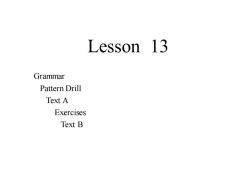
Lesson 13 Grammar Pattern Drill Text A Exercises Text B
Lesson 13 Grammar Pattern Drill Text A Exercises Text B
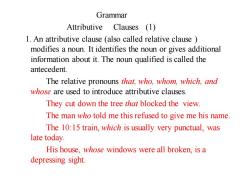
Grammar Attributive Clauses (1) 1.An attributive clause (also called relative clause modifies a noun.It identifies the noun or gives additional information about it.The noun qualified is called the antecedent. The relative pronouns that,who,whom,which,and whose are used to introduce attributive clauses. They cut down the tree that blocked the view. The man who told me this refused to give me his name. The 10:15 train,which is usually very punctual,was late today. His house,whose windows were all broken,is a depressing sight
Grammar Attributive Clauses (1) 1. An attributive clause (also called relative clause ) modifies a noun. It identifies the noun or gives additional information about it. The noun qualified is called the antecedent. The relative pronouns that, who, whom, which, and whose are used to introduce attributive clauses. They cut down the tree that blocked the view. The man who told me this refused to give me his name. The 10:15 train, which is usually very punctual, was late today. His house, whose windows were all broken, is a depressing sight
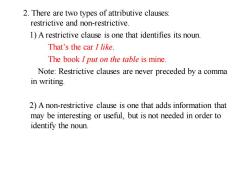
2.There are two types of attributive clauses: restrictive and non-restrictive. 1)A restrictive clause is one that identifies its noun. That's the car I like. The book I put on the table is mine. Note:Restrictive clauses are never preceded by a comma in writing. 2)A non-restrictive clause is one that adds information that may be interesting or useful,but is not needed in order to identify the noun
2. There are two types of attributive clauses: restrictive and non-restrictive. 1) A restrictive clause is one that identifies its noun. That’s the car I like. The book I put on the table is mine. Note: Restrictive clauses are never preceded by a comma in writing. 2) A non-restrictive clause is one that adds information that may be interesting or useful, but is not needed in order to identify the noun
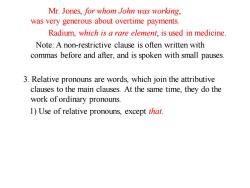
Mr.Jones,for whom John was working, was very generous about overtime payments. Radium,which is a rare element,is used in medicine. Note:A non-restrictive clause is often written with commas before and after,and is spoken with small pauses. 3.Relative pronouns are words,which join the attributive clauses to the main clauses.At the same time,they do the work of ordinary pronouns. 1)Use of relative pronouns,except that
Mr. Jones, for whom John was working, was very generous about overtime payments. Radium, which is a rare element, is used in medicine. Note: A non-restrictive clause is often written with commas before and after, and is spoken with small pauses. 3. Relative pronouns are words, which join the attributive clauses to the main clauses. At the same time, they do the work of ordinary pronouns. 1) Use of relative pronouns, except that
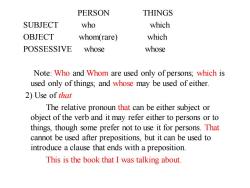
PERSON THINGS SUBJECT who which OBJECT whom(rare) which POSSESSIVE whose whose Note:Who and Whom are used only of persons;which is used only of things;and whose may be used of either. 2)Use of that The relative pronoun that can be either subject or object of the verb and it may refer either to persons or to things,though some prefer not to use it for persons.That cannot be used after prepositions,but it can be used to introduce a clause that ends with a preposition. This is the book that I was talking about
PERSON THINGS SUBJECT who which OBJECT whom(rare) which POSSESSIVE whose whose Note: Who and Whom are used only of persons; which is used only of things; and whose may be used of either. 2) Use of that The relative pronoun that can be either subject or object of the verb and it may refer either to persons or to things, though some prefer not to use it for persons. That cannot be used after prepositions, but it can be used to introduce a clause that ends with a preposition. This is the book that I was talking about
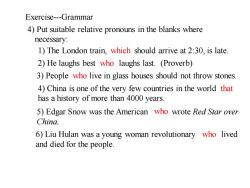
Exercise---Grammar 4)Put suitable relative pronouns in the blanks where necessary: 1)The London train,which should arrive at 2:30,is late. 2)He laughs best who laughs last.(Proverb) 3)People who live in glass houses should not throw stones. 4)China is one of the very few countries in the world that has a history of more than 4000 years. 5)Edgar Snow was the American who wrote Red Star over China. 6)Liu Hulan was a young woman revolutionary who lived and died for the people
Exercise---Grammar 4) Put suitable relative pronouns in the blanks where necessary: 1) The London train, should arrive at 2:30, is late. which 2) He laughs best laughs last. (Proverb) who 3) People live in glass houses should not throw stones. who 4) China is one of the very few countries in the world has a history of more than 4000 years. that 5) Edgar Snow was the American wrote Red Star over China. who 6) Liu Hulan was a young woman revolutionary lived and died for the people. who
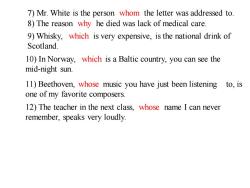
7)Mr.White is the person whom the letter was addressed to 8)The reason why he died was lack of medical care. 9)Whisky,which is very expensive,is the national drink of Scotland. 10)In Norway,which is a Baltic country,you can see the mid-night sun. 11)Beethoven,whose music you have just been listening to,is one of my favorite composers. 12)The teacher in the next class,whose name I can never remember,speaks very loudly
7) Mr. White is the person the letter was addressed to. whom 8) The reason he died was lack of medical care. why 9) Whisky, is very expensive, is the national drink of Scotland. which 10) In Norway, is a Baltic country, you can see the mid-night sun. which 11) Beethoven, music you have just been listening to, is one of my favorite composers. whose 12) The teacher in the next class, name I can never remember, speaks very loudly. whose
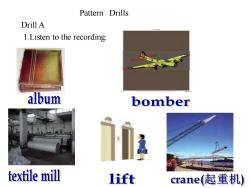
Pattern Drills Drill A 1.Listen to the recording: album bomber textile mill lift crane(起重机)
Pattern Drills Drill A 1.Listen to the recording:
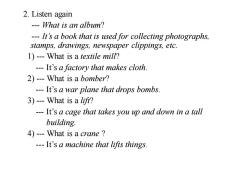
2.Listen again --What is an album? ---It's a book that is used for collecting photographs, stamps,drawings,newspaper clippings,etc. 1)---What is a textile mill? ---It's a factory that makes cloth. 2)---What is a bomber? ---It's a war plane that drops bombs. 3)---What is a lift? ---It's a cage that takes you up and down in a tall building. 4)---What is a crane --It's a machine that lifts things
2. Listen again --- What is an album? --- It’s a book that is used for collecting photographs, stamps, drawings, newspaper clippings, etc. 1) --- What is a textile mill? --- It’s a factory that makes cloth. 2) --- What is a bomber? --- It’s a war plane that drops bombs. 3) --- What is a lift? --- It’s a cage that takes you up and down in a tall building. 4) --- What is a crane ? --- It’s a machine that lifts things
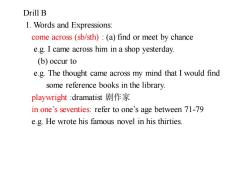
Drill B 1.Words and Expressions: come across(sb/sth):(a)find or meet by chance e.g.I came across him in a shop yesterday. (b)occur to e.g.The thought came across my mind that I would find some reference books in the library. playwright:dramatist剧作家 in one's seventies:refer to one's age between 71-79 e.g.He wrote his famous novel in his thirties
Drill B 1. Words and Expressions: come across (sb/sth) : (a) find or meet by chance e.g. I came across him in a shop yesterday. (b) occur to e.g. The thought came across my mind that I would find some reference books in the library. playwright :dramatist 剧作家 in one’s seventies: refer to one’s age between 71-79 e.g. He wrote his famous novel in his thirties
按次数下载不扣除下载券;
注册用户24小时内重复下载只扣除一次;
顺序:VIP每日次数-->可用次数-->下载券;
- 吉林大学:《综合英语精读》课程电子教案(PPT课件,一)12 Grammar Pattern Drills.ppt
- 吉林大学:《综合英语精读》课程电子教案(PPT课件,一)11 Grammar Pattern drills.ppt
- 吉林大学:《综合英语精读》课程电子教案(PPT课件,一)10 Grammar Pattern Drills.ppt
- 吉林大学:《综合英语精读》课程电子教案(PPT课件,一)09 Grammar Patten Drills.ppt
- 吉林大学:《综合英语精读》课程电子教案(PPT课件,一)08 Revision(I).ppt
- 吉林大学:《综合英语精读》课程电子教案(PPT课件,一)07 Using the Sun’s Energy.ppt
- 吉林大学:《综合英语精读》课程电子教案(PPT课件,一)06 Cambridge - the University Town.ppt
- 吉林大学:《综合英语精读》课程电子教案(PPT课件,一)04 Grammar Pattern Drill.ppt
- 吉林大学:《综合英语精读》课程电子教案(PPT课件,一)02(主讲教师:张莘梅).ppt
- 吉林大学:《英语听说》课程电子教案(PPT课件)unit17 At the Hotel 2.ppt
- 吉林大学:《英语听说》课程电子教案(PPT课件)unit21 Special English 2.ppt
- 吉林大学:《英语听说》课程电子教案(PPT课件)unit16 At the Hotel 1.ppt
- 吉林大学:《英语听说》课程电子教案(PPT课件)unit1-unit11(主讲人:董育英、寇晓虹).ppt
- 吉林大学:《英语听说》课程电子教案(PPT课件)unit23 Special English.ppt
- 吉林大学:《英语听说》课程电子教案(PPT课件)unit22 Special English.ppt
- 吉林大学:《英语听说》课程电子教案(PPT课件)unit20 Special English 1.ppt
- 吉林大学:《英语听说》课程电子教案(PPT课件)unit18-19 UNIVERSITY LIFE.ppt
- 吉林大学:《英语听说》课程电子教案(PPT课件)unit15 Service and economy.ppt
- 吉林大学:《英语听说》课程电子教案(PPT课件)unit14 Transportation.ppt
- 吉林大学:《英语听说》课程电子教案(PPT课件)unit13 family.ppt
- 吉林大学:《综合英语精读》课程PPT教学课件(二)lesson 05 Beauty is Truth.ppt
- 吉林大学:《综合英语精读》课程PPT教学课件(二)lesson 06 Button, Button.ppt
- 吉林大学:《综合英语精读》课程PPT教学课件(二)lesson 07 Twelve Angry Men(Part One)By Reginald Rose.ppt
- 吉林大学:《综合英语精读》课程PPT教学课件(二)lesson 08 Twelve Angry Men(Part Two)By Reginald Rose.ppt
- 吉林大学:《综合英语精读》课程PPT教学课件(二)lesson 01 Christmas Day in the Morning.ppt
- 吉林大学:《综合英语精读》课程PPT教学课件(二)lesson 02 The Nightingale and the Rose.ppt
- 吉林大学:《综合英语精读》课程PPT教学课件(二)lesson 03 Clearing in the sky.ppt
- 吉林大学:《综合英语精读》课程PPT教学课件(二)lesson 04 Darken your Graying hair, and Hide your Fright.ppt
- 吉林大学:《综合英语精读》课程PPT教学课件(二)lesson 09 Pompeii.ppt
- 吉林大学:《综合英语精读》课程PPT教学课件(二)lesson 10 The Man in Asbestos(负责人:张而立).ppt
- 吉林大学:《综合英语精读》课程PPT教学课件(二)lesson 11 Diogenes and Alexander(主讲人:郑世华).ppt
- 吉林大学:《综合英语精读》课程PPT教学课件(二)lesson 12 Farewell, My Unlovely.ppt
- 吉林大学:《综合英语精读》课程PPT教学课件(三)lesson 13 Mr. Imagination.ppt
- 吉林大学:《综合英语精读》课程PPT教学课件(三)lesson 14 The Odour of Cheese.ppt
- 吉林大学:《综合英语精读》课程PPT教学课件(三)lesson 15 A Horseman in the Sky.ppt
- 吉林大学:《综合英语精读》课程PPT教学课件(三)lesson 16 The Oyster and the Pearl.ppt
- 吉林大学:《综合英语精读》课程PPT教学课件(三)lesson 17 Multinational Corporations.ppt
- 吉林大学:《综合英语精读》课程PPT教学课件(四)Book 4 lesson 1 The Pleasure of learning.ppt
- 吉林大学:《综合英语精读》课程PPT教学课件(四)Book 4 lesson 2 A Dill Pickle.ppt
- 吉林大学:《综合英语精读》课程PPT教学课件(四)Book 4 lesson 3 SOLVE THAT PROBLEM - WITH HUMOR.ppt
